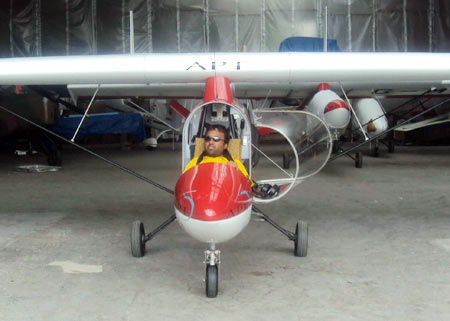
Nothing deters this 26-year-old wheelchair-bound lawyer from living life to the fullest, discovers Shobha Warrier.
Continuing our series on Extraordinary Indians.
He is a successful lawyer.
He has travelled across the world -- to beaches, mountains, cities and villages. He has flown planes and explored the depths of the seas. He co-edits a magazine.
And he has done all of this while seated on a wheelchair!
The fact that he suffers from spinal muscular atrophy has not deterred him from travelling the world or adopting an adventurous lifestyle.
Meet 26-year-old Srin Madipalli from London, whose determination, enthusiasm and verve is inspirational.
In this e-mail interview, Srin tells Rediff.com's Shobha Warrier about his life, travels and the 'positive' magazine he has launched with his friend, Martyn Sibley, for the physically disabled.
Do you know of such tales of inspiration? Do share them with other Rediff.com readers.
If you have photos to go with your story, send them to us.
If you have videos, do upload them on our video-sharing site, iShare, and send us the link.
You can mail us at inspiring_tales@rediffmail.com
Please ...
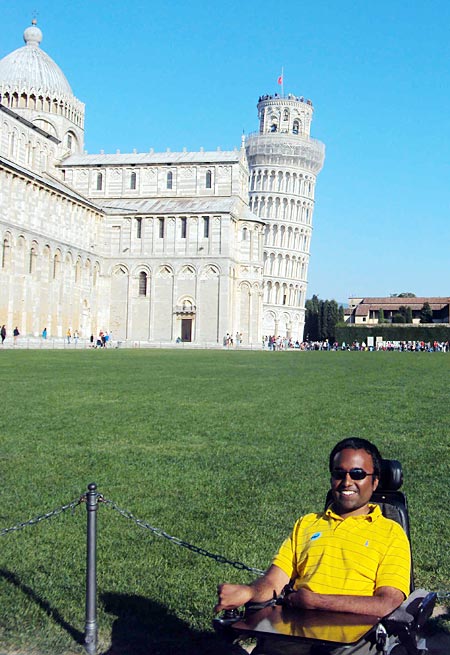
When did the symptoms of spinal muscular atrophy appear?
Spinal muscular atrophy is a genetic neuromuscular condition that I was born with.
Within a few months of being born, my parents noticed that I was physically very weak and couldn't move much or walk.
I was officially diagnosed when I was two.
As a 26-year-old, my disability means that I can't walk. I have very little movement in my arms and hands.
I use a powered wheelchair for mobility. I also manage a team of carers who I employ to look after me so that I can live independently.
How did you deal with it?
I was diagnosed as a baby and have never known anything different. Therefore, there was never any individual event or period to 'deal' with.
Though growing up with a physical disability posed its own unique challenges and difficulties, overcoming the obstacles before me was never traumatic.
It was just hard work!
Please ...
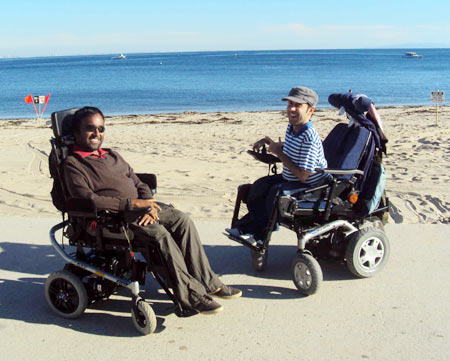
You are known to be very optimistic; have you always been a positive person?
I like to think so!
Everybody has ups and downs along with a mix of good and bad days, but, overall, I guess I would consider myself one of life's natural optimists.
I've always believed that a person's focus usually determines his reality.
By focusing on what I can do, rather than dwelling on what I cannot do, the reality of my life has very much been a positive experience.
When did you meet Martyn Sibley? Can you describe your friendship?
I briefly met Martyn when I was 10 years old at a conference run by a charity called the Jennifer Trust for Spinal Muscular Atrophy. But we didn't really get to know each other properly for another 11 years or so!
It was quite unexpected as to how we got back in touch.
In 2007, Martyn was moving to London, from his parents' home near Cambridge. As I am from and live in London, the JTSMA put Martyn in touch with me, to see if I could provide any advice or help with regard to his move to London.
From then on, we've become great friends!
Please ...
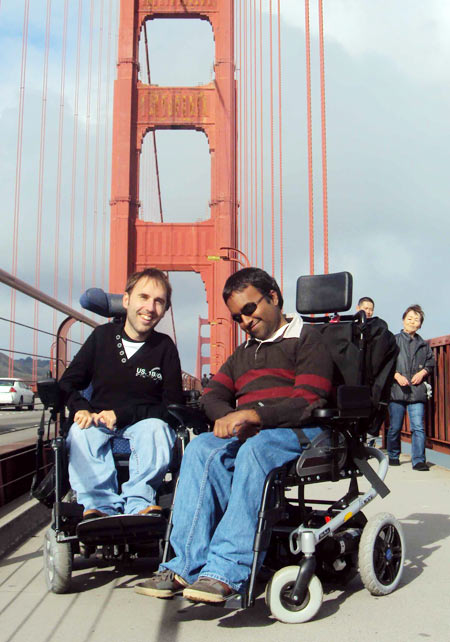
When did you and Martyn feel the need to start Disability Horizons?
In the winter of 2010, I was travelling around the world for four months during a sabbatical from work.
Martyn joined me in California for two weeks, where we hired a van with our two care assistants and travelled from San Francisco to Los Angeles via the Yosemite National Park and Las Vegas.
Prior to this trip, Martyn had been running a personal blog about his life and sharing day-to-day experiences. Similarly, I had already been travelling for two months and had just completed a training contract to become a lawyer.
I had wanted, for a long time, to share my knowhow and experience of living with a disability; I wanted to create a useful resource and a platform of information.
Between us, we felt there was a real need to provide a resource that was informative, useful and inspiring.
At the same time, it would be a neutral platform that acted as a collective hub of experiences faced by every day disabled people around the world, trying to achieve something that they set out to do.
Please ...
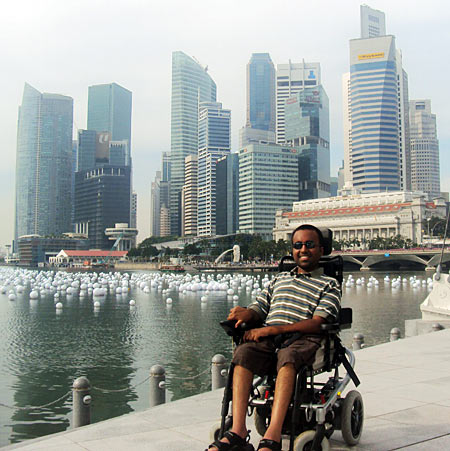
How did you come up with the name?
There were varied reasons -- some idealistic, some pragmatic.
We wanted a name that reflected our positive outlook and the positive platform we were intending to create.
We also wanted a name that would be easy to remember and easy to search on the Web. We wanted something that could be used as a domain name.
Was it a conscious decision on your part to have only positive and inspiring articles on Disability Horizons?
Yes. We wanted our (online) magazine to be an informative, useful and helpful resource. To serve that purpose, any article would naturally need to have a positive, constructive and helpful focus.
Please ...
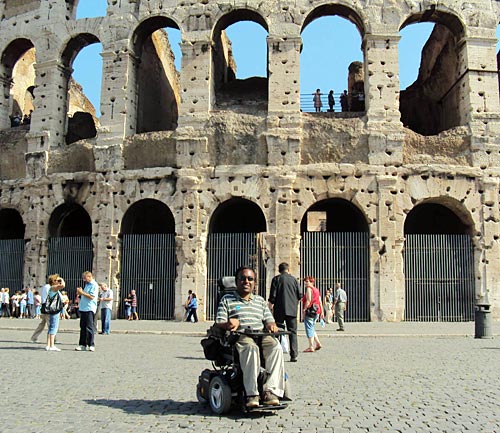
How do you choose articles and who are your writers?
Anyone can write for Disability Horizons.
Via social media and through our own personal and professional networks, we invite people to propose article ideas.
Over time, some writers have come to write for us on a more regular basis on topics that they have a personal interest in.
To date, we've had lots of writers, many of who have never written an article for a publication, but who want to share their story or experience.
Do you have any writers from India?
My cousin, Pratyush Nalum who has SMA as well, writes for the magazine. He studies at IIT-Mumbai and he is a total genius!
We have only one writer from India, but would like many more.
How do you two manage your work and the Web site?
It can be difficult at times!
Martyn has been working very hard to establish his amazing social enterprise that helps disabled people here in the UK and I work as a corporate lawyer at one of the world's leading law firms.
While we have to be very organised, we also have a team of dedicated volunteers who kindly share their time to help us manage the site.
Please ...
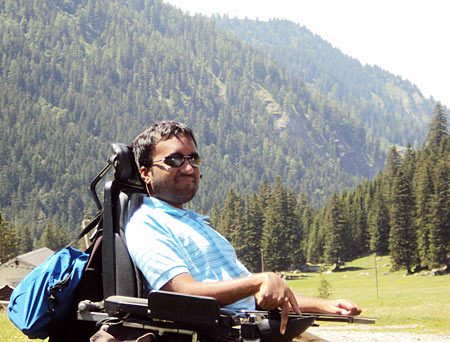
How is it living in the UK? Do you face any discrimination?
Some fellow disabled Brits will probably disagree with me in the light of recent cuts that have been made to welfare support and disability related benefits, but as a person who has travelled to many places around the world, I do truly believe that the UK is one of the better places to live if you are disabled and a wheelchair user.
While I have had to work extremely hard for many years for long hours and perseveringly fight to earn the life I have, I do receive a platform of state support and legal rights along with the support of a loving group of family and friends that have made what I have achieved possible.
I received a mainstream education at a regular state school. I was able to go to university and graduate top of my class with a first class degree and live on campus with my friends.
I also received funding from the British government to employ carers to look after me so that I can live independently.
All civic and public buildings must be wheelchair accessible, and many shopping centres, cinemas, restaurants and other leisure facilities are fully accessible too.
In London, all the public buses and taxis, and some train routes, are wheelchair accessible. The pedestrian side walks are usually smoothly paved and most crossings have ramped drop downs in order to cross the road.
I love the fact that, if I feel like going down the road for coffee or to the grocery store, then I can just go on my own in my powered wheelchair without needing anyone to help me.
In terms of discrimination, while I have never faced direct discrimination, I do come up against ignorance and patronising attitudes. Moreover, while many buildings are fully wheelchair accessible, I do still come across places which aren't, and in theUK, there is very little excuse for this.
I must caution however that my experience of life as a disabled person is probably quite unique. Many disabled people in the UK are still unemployed and face barriers and difficulties in accessing social care, healthcare and education.
You often have to fight through many layers of bureaucracy to get these things and that can be tough for many.
Please ...

You two have travelled a lot. Can you tell us about some of the adventures you had?
Together, Martyn and I have only travelled twice, once to California in November 2010 and once to New York City in September 2011.
Those two trips were full of excitement and adventure and hopefully there will be many more to come.
Martyn and I have travelled independently to many places with our friends and families as well.
I can't recall all the places where Martyn has travelled, but I know in recent years he has been to Australia and the US, along with trips to various parts of Europe.
He is currently working on a voluntary project in Spain.
From my own perspective, as mentioned earlier, I travelled for four months with my care assistant in 2010, which took me around Europe, the US, South Africa, Singapore and Indonesia.
In 2011, I went to Spain twice, Switzerland, the US again and recently just came back from a holiday in Singapore and Australia.
While I haven't been to India since 2009, I've been to Hyderabad many times to visit family.
In terms of highlights of those adventures, I would probably choose scuba diving in Bali (Please watch videos of Srin's Bali trip here and here), a camping safari in South Africa and driving through the Yosemite National Park in the US.
How do you choose a place to travel?
As my university had lots of international students and my workplace also employs people from many different nationalities, I have friends located in many parts of the world who I enjoy visiting.
I've been to other places where I've not known anybody; I've gone there because they were places I've always wanted to visit.
Please ...

Did you face any difficulties to travel as a physically disabled person?
Lots! When I fly I need to be manually lifted several times as my wheelchair has to be separately stowed away in the cargo.
I need to take lots of specialist equipment including my powered wheelchair, a MoLift Smart Lifting Hoist (a special machine which lifts me) and a shower chair.
I have to be very well organised as I need adapted wheelchair accessible transport (it is difficult to manually lift me) and accessible accommodation.
There is always the risk that my equipment, which I am 100 per cent dependent on, is damaged during the flight or breaks down.
However, I believe that for any problem that comes in front of me, there will be an answer or solution.
Please ...
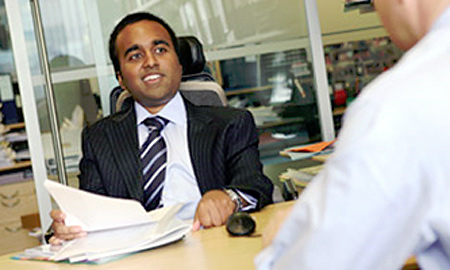
Unlike you, most of the physically disabled persons in India are home bound as the outside world is not disabled people-friendly. What would you tell them?
Nothing will change unless you politically fight for it.
I am the beneficiary of a civil rights campaign in the UK that was bravely fought by disabled people here for nearly half a century.
The support, assistance, infrastructure and most importantly the human and legal rights that I have in the UK are only here because disabled people before me campaigned very hard for them.
Disabled people in India need to campaign and politically lobby for the same thing. The first thing that you need to do is to organise into one strong voice.
The Internet now allows this to happen much more easily.
There are already organisations such as ADAPT run by the amazing Malini Chib in Mumbai who are already trying to do this, but more people (both disabled and non-disabled) need to join in.
Once there is one strong voice for disabled people in India, you need to campaign hard to make sure society provides and protects the human rights of disabled people, and is also required to invest in disabled people and ensure that they have access to education, healthcare, social care, public buildings and infrastructure.
I would be happy to help!